On managing and mentoring
You may know Jenna Hendershot from her tenure on the American Society for Biochemistry and Molecular Biology’s Education and Professional Development Committee. She was the committee’s first student member and a founding member and chair of the subgroup of graduate students and postdocs, a position she stepped down from last December to focus on her new job as a senior scientist at the diagnostic testing company Progenity.

Name: Jenna Hendershot
Current position: Senior scientist, protein biomarkers, Progenity Inc.
Education: Ph.D., University of Michigan Medical School, 2014
First job outside of academia: scientist I- product development – Cayman Chemical
Favorite molecule or protein: Adenine DNA glycosylase. “It flips a damaged DNA base 180 degrees out of the DNA, into the enzyme’s active site. In graduate school I studied nucleotide flipping on the millisecond timescale, using a naturally fluorescent damaged base.”
When Hendershot, of Ann Arbor, Michigan, took that job, she was excited to work with a team developing a new type of test. While Progenity is best known for prenatal DNA testing based on maternal blood draws, Hendershot works with a proteomics-based team developing a test for preeclampsia, a dangerous complication of pregnancy. “I had heard about preeclampsia,” she said, “but it wasn’t until I started working on it that I realized how many people are affected.”
ASBMB Today caught up with Hendershot about her new role in July. This conversation has been condensed and lightly edited for clarity.How did you come to pursue a career in biotechnology?
In graduate school, I was so envious of the life that my undergrad research advisor had. I said, “That's exactly what I want to do: have a lab, do research and teach biochemistry.” I was set on that for a very long time.
Then in my fourth year of grad school, I received a grant that required a three-month internship in industry. I cold-called and applied online and ended up in a summer research program at Dow Agrosciences in Indianapolis. It was designed for undergrads, so they provided housing, they took you to baseball games and had lots of events. As the only graduate student with all these undergrads, I was like the mama bear. But the work was wonderful, and it completely changed my whole perspective on my career. I fell in love with the pace of the projects and working for something that will go out and change people's lives. It was also appealing that you could work from eight to five and turn the lights off and go home, along with knowing that the money was good. It was life changing.
After graduate school, I joined Cayman Chemical as a scientist. I developed biochemical assay kits for anything you can imagine — enzyme activity kits, inhibitor screening kits, ELISAs; fluorometric, colorimetric, fluorescence polarization readouts … Give me a topic, and I would make a kit for it. Each one was its own little puzzle, with the added complexity that in 10 years, somebody has to make the same components, and they have to work exactly the same way they did when you first made the kit.
I learned a ton and I really enjoyed it, but after five years, I wasn't being challenged as much. I started applying to jobs just to see what was out there. I landed my position as a senior scientist at Progenity —which is actually just across the street from Cayman Chemical in Ann Arbor.
We’re speaking in the time of COVID, so nobody’s days are normal. But what does a day in your life at your current job look like?
I get up before anyone else is up, at 4:30 or 5, to try to catch up on emails or documentation. Then I have a bit of a break to get the kids ready for daycare, and start my day at 8:30.
Most of my day now is meetings. I have one-on-one meetings with my group members for mentoring and to make sure they’re on track. I’m also leading a lot of larger cross-disciplinary meetings.. There's a lot of coordinating and communicating across groups. I make sure scheduling is on track, help with experiment planning, and do analysis and protocol documentation.I thought I was really good at time management. Now that I'm managing and not in the lab, there’s so much to do and juggle that I could work every hour of the day, if I physically or mentally could. I still think I’m decent at time management, but there’s a lot to fit into a limited amount of time. I’m trying to adjust and figure out what is the new normal for work–life balance, in this position and also in the time of COVID. I can tell I’ve grown a lot since December — which is exciting!
What skills do you need in your current role that you didn’t learn in graduate school?
Dealing with people. As a student, you’re used to looking at data and being at the bench for hours; if you don’t want to, you don’t have to interact with very many people … outside of collaborations.
So all of a sudden when you’re tasked with leading a group and dealing with all the different personalities and the work ethics, it's a whole new game. In some ways, I feel very naïve, because I haven't had that kind of training. I'm learning on the job, which is working okay, but I would love to have some sort of course in my back pocket.
Tell me a little about the role of networking and mentoring in your career?
I've had a number of people that I have reached out to along the way. I think it happens that people come into your life at the perfect moment, and sometimes they vanish from your life naturally. I've had incredibly helpful people come and go, but as far as a whole-career mentor, I have not had that. Maybe that doesn’t exist. I don't know.
I try to be a mentor whenever I can, because I know how hard it is to find one. I've never turned down an informational interview, and (before COVID) I used to meet for coffee whenever people would contact me. It was a great opportunity for me to share my knowledge, but I would also always learn something. It’s a two-way street, and anytime I can help out, I'm happy to.
What advice do you have for students who are interested in following a path like yours?
I didn't realize how critical that one three-month internship was going to be. It was life-changing. I completely changed my career path because of that experience.
I know that it's hard to get internships, and really hard to leave Ph.D. programs because advisors don't want you leaving the lab. But if you are interested in a career in anything other than academia, my No. 1 recommendation would be to apply for an internship. You really don't know until you try something whether you're going to like it or not.
If you're not allowed to leave for an internship, then do informational interviews. Everybody’s career trajectory is different, and there's no one way to do it. There are lots of different routes, and it's really useful to talk to people and learn what worked for them and what didn't.
Enjoy reading ASBMB Today?
Become a member to receive the print edition four times a year and the digital edition monthly.
Learn moreGet the latest from ASBMB Today
Enter your email address, and we’ll send you a weekly email with recent articles, interviews and more.
Latest in Industry
Industry highlights or most popular articles

How Alixorexton could transform narcolepsy treatment
A new investigational drug, alixorexton, targets the brain’s orexin system to restore wakefulness in people with narcolepsy type 1. Alkermes chemist Brian Raymer shares how molecular modeling turned a lab idea into a promising phase 3 therapy.

Inside industry postdocs
As more Ph.D. scientists look beyond academia, industry postdocs offer a new kind of training, where mentorship meets mission-driven research. Fellows at Pfizer and Genentech share how these programs prepare them to translate discovery into impact.

Black excellence in biotech: Shaping the future of an industry
This Black History Month, we highlight the impact of DEI initiatives, trailblazing scientists and industry leaders working to create a more inclusive and scientific community. Discover how you can be part of the movement.

Attend ASBMB’s career and education fair
Attending the ASBMB career and education fair is a great way to explore new opportunities, make valuable connections and gain insights into potential career paths.

Benefits of attending a large scientific conference
Researchers have a lot of choices when it comes to conferences and symposia. A large conference like the ASBMB Annual Meeting offers myriad opportunities, such as poster sessions, top research talks, social events, workshops, vendor booths and more.

Biotech startup worms its way into therapeutics
Andrea Choe's company, Holoclara, has created an anti-inflammatory drug based on a molecule from worms.

